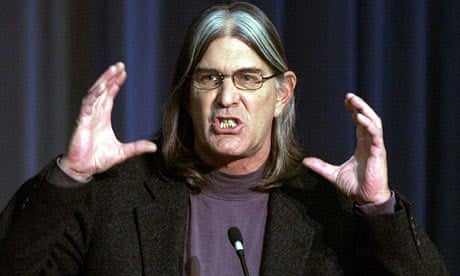Spectators crowded into a courtroom in Denver today to hear the testimony of a high-profile professor who claims he was fired for writing an essay in which he referred to the victims of the 9/11 terrorist attacks as "little Eichmanns", triggering an avalanche of criticism in the American media.
Wearing blue jeans and cowboy boots, Ward Churchill, 61, also addressed what the University of Colorado insists was the real reason for his sacking: accusations of misconduct surrounding his academic work, in which he alleges that the US army deliberately poisoned Native Americans in the 17th century.
During two days on the witness stand, Churchill, who is suing the university for wrongful termination, defended his 9/11 remarks. His reference to "little Eichmanns", he said, was intended to make the case that even those with innocent roles in a system bear collective responsibility for perpetuating it, though he acknowledged his words might have upset bereaved families.
The terrorist attacks on New York and Washington, he said, had been "perfectly predictable. The US has been doing things to people and the world as a matter of course, as a matter of routine ... if you make a practice of killing other people's babies for personal gain, comfortability, quality of life, [then] eventually they're going to give you a taste of the same thing."
His original essay drew condemnation from across the political spectrum, and prompted the Fox News presenter Bill O'Reilly to remark that Churchill was "simply a traitor".
But much of the back-and-forth in Denver district court has centred on claims of misconduct that surfaced after the essay furore, concerning a much older claim of US government wrongdoing.
Churchill, a former professor of ethnic studies, was officially dismissed in July 2007 over work in which he alleged that the American military had sent blankets infected with smallpox to decimate the Wampanoag Indians.
University of Colorado lawyers have argued that there is no evidence for the claim, and that Churchill's "seriously flawed" work involved fabrication, plagiarism and citations of work purportedly by other scholars that he had, in reality, ghostwritten himself. Churchill responded that such ghostwriting was "very common" in academia, and that the smallpox allegations were part of Native American oral tradition.
"I had information I could have cited, but I didn't expect it to be necessary because I thought it was common knowledge that the army had deliberately infected Indians with smallpox," he said, though today he brought a binder of evidence to the witness stand in an effort to convince the jury.
In tearful testimony, Russell Means, a fellow professor and one of the best-known Native American activists, said Churchill had been the victim of a "scholarly massacre".
But Michael Radelet, a member of the faculty committee that took the decision to fire him, insisted the university had "leaned over backwards to give Professor Churchill the benefit of the doubt, to give him a break where a break was needed".
It was "just sad," Radelet added, "to see a person like this, beloved like this, with many talents. But he just cheated." The trial is expected to conclude this week.
